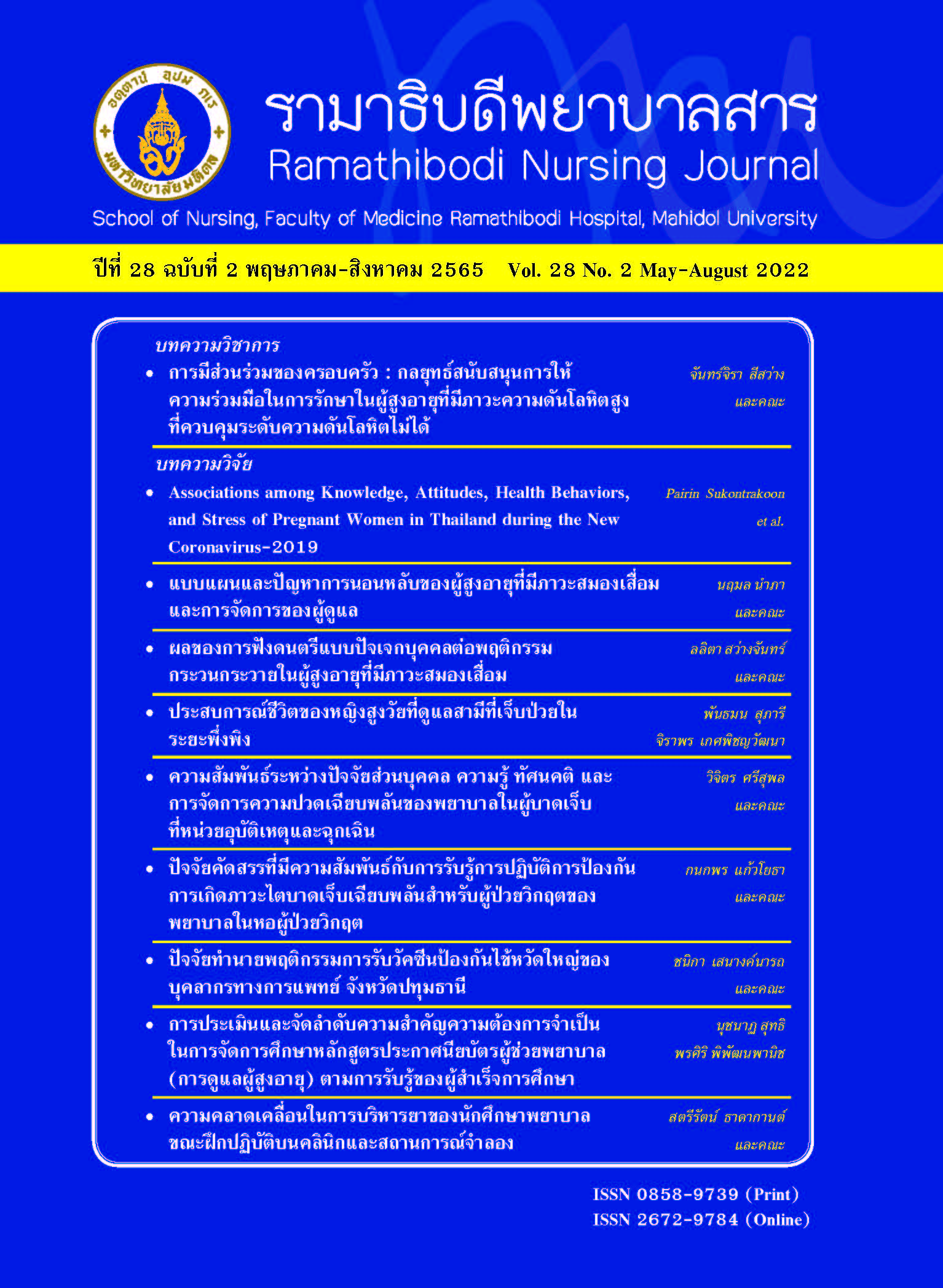Lived Experience of Older Women Caring for Frail Dependent Elderly Spouses
Main Article Content
Abstract
This research aimed to study the lived experience of older women caring for a frail, dependent elderly spouse using the qualitative research method and phenomenology of Martin Heidegger. The key informants were 14 older women who were the main caregivers of a frail, dependent elderly spouse, selected through the purposive sampling method. The data were collected through an in-depth interview, observation, notes, and tape recordings. The data were then transcribed using verbatim transcription and analyzed using content analysis. The results indicated that the meanings of being a caregiver to a frail, dependent elderly spouse provided by the informants could be divided into two points: 1) taking care with deep connection and 2) taking care because they had been through difficulties together. It was also found that the experience of older women caring for a frail, dependent elderly spouse could be categorized into three themes, which were 1) life changed, 2) acceptance and learning of being caregivers, and 3) being a caregiver in the context of being a wife. The findings of this study could lead to an understanding of lived experiences of older women caring for a frail, dependent elderly spouse and serve as guidelines to help wives who take care of a frail, dependent elderly spouse for efficient care.
Keywords: Lived experience, Older women, Dependent, Elderly spouse
Article Details

This work is licensed under a Creative Commons Attribution-NonCommercial-NoDerivatives 4.0 International License.
บทความ ข้อมูล เนื้อหา รูปภาพ ฯลฯ ที่ได้รับการตีพิมพ์ในรามาธิบดีพยาบาลสาร ถือเป็นลิขสิทธิ์ของวารสาร หากบุคคลหรือหน่วยงานใดต้องการนำทั้งหมดหรือส่วนหนึ่งส่วนใดไปเผยแพร่หรือเพื่อกระทำการใด ใด จะต้องได้รับอนุญาตเป็นลายลักษณ์อักษรจากรามาธิบดีพยาบาลสารก่อนเท่านั้น
References
Nation Statistical Office. The 2014 survey of the older person in Thailand. Bangkok: Text and Journal Publication; 2014. (in Thai)
Chokwiwat W, Caring for the dependent elderly; 2017[cited 2017 March 7]. Available from Thaihealth Website:
http://www.thaihealth.or.th/Content/35697.html (in Thai)
Foundation of Thai Gerontology Research and Development.Situation of the Thai Elderly 2016. Nakhon Prathom:Printery; 2017. (in Thai)
Sihapark S, Chuengsatiansup K, Tengrang K. The burden and impact of long–term care for the elderly in Thailand. Bangkok:
Health Systems Research Institute (HSRI); 2013. (in Thai)
Economic and Social Council. Overview of trends in population ageing and related institutional responses in Asia and the Pacific; 2017 [cited 2017 October 21]. Available from ESCAP Web site: https://mipaa.unescapsdd.org/files/documents/E_ESCAP_MIPAA_IGM.2_29.PDF
Foundation of Thai Gerontology Research and Development.Situation of the Thai Elderly 2017. Bangkok: October Print; 2018. (in Thai)
Kasemkitwattana S, Investigate adjustment problems faced by stroke patients’ family caregivers. Thai Journal of Nursing
Council. 2014;29(4):22-31. (in Thai)
Montrikul Na Ayudhaya B. The role of women in Thai society.Governance Journal. 2017;5(2):23-37.
Phulsawat A. Changes in the elderly; 2017 [cited 2017 November 23]. Available from Mahidol Web site: http://
www.gj.mahidol.ac.th/th/wp-content/uploads/conference/2560/chnge.pdf (in Thai)
Coombs UE. Spousal caregiving for stroke survivors. J Neurosci Nurs. 2007;39(2):112-9.
Rosland A, Heisler M, Choi H. Family influences on selfmanagement among functionally independent adults with diabetes or heart failure: do family members hinder as much as they help?. Chronic Illn. 2010;6(1):22-33.
Kim Y, Carver CS, Shaffer KM, Gansler T, Cannady RS. Cancer caregiving predicts physical impairments: roles of earlier
caregiving stress and being a spousal caregiver. Cancer.2016;121(2):302-10.
Smith CE, Piamjariyakul U, Yardrich DM, Ross VM, Gajewski B, William AR. Complex homecare: part3-economic impact on family caregiver quality of life and patients, clinical outcome.Nurs Econ. 2012;28(6):393-414.
Chaowararak N, Soonthornchaiya R. Experiences of elderly caregivers in caring for elderly depressed patients. Journal
of Psychiatric Nursing and Mental Health. 2016;39(7):110-22. (in Thai)
Kitko LA, Hupcey JE. The work of spousal caregiving of older adults with end-stage heart failure. J Gerontol Nurs.2013;39(7):40-7.
Longphasuk N, Monkong S, Sirapo-ngam Y. Health conditions and self-care activities of older caregivers caring for bedridden older adults. Thai Journal of Nursing Council.2018;33(2):97-109. (in Thai)
Rattanawimol C. Role strain of family caregivers of dependent elderly: a case study of the municipality of Sukhothai province.
[thesis]. Bangkok: Chulalongkorn University; 2002.(in Thai)
Heidegger M. The Oxford Handbook of Process Philosophy and Organization Studies. England: Oxford University Press; 1889.
Phothisita C. Qualitative research. 7th ed. Bangkok: Amarin Printing; 2016. (in Thai)
Jitapunkul S. Dependence in the elderly. In: Jitapunkul S,editors. National health examination survey in 1996-1997.Bangkok: Organization for the delivery of goods and materials;1996. p.142-50. (in Thai)
Saengmane S, Arpanantikul M, Sirapo-ngam Y. A case study:adaptation of a working caregiver to a stroke patient. Ramathibodi
Nursing Journal. 2012;18(1):119-33. (in Thai)
Dudovskiy J. Apple value chain analysis; 2018 [cited 2018 February 23]. Available from Business research methodology
Web site: http://research-methodology.net/applevalue-chain-analysis/
Guba EG, Lincoln YS. Completing paradigm in qualitative research. Thousand Oaks: CA; 1994.
Watson J. Nursing: human science and human care: a theory of nursing. Norwalk, Connecticut: Appletion-Century-Crofts; 1985.
Mesri K, Selected factors related to dependent care agency among caregivers of schizophrenic patients in community.
[thesis]. Bangkok: Chulalongkorn; 2011. (in Thai)
Jungbauer J, Dietrich S. The disregarded caregivers:subjective burden in spouses of schizophrenia patients.Schizophr Bull. 2004;30(3):665-75.
Bumpemphol K. Social support in patients with schizophrenia. Journal of Psychiatric Association of Thailand. 2013;58(1):89-100. (in Thai)
Lawn S, McMahon J. The importance of relationship in understanding the experiences of spouse mental health carers. Qual Health Res. 2014;24(2):254-66.
Lindau ST, Surawska H, Paice J, Baron SR. Communication about sexuality and intimacy in couples affected by lung cancer and their clinical‐care providers. Psychooncology.2011;20(2):179-85.
Family Caregiver Alliance[Internet]. Caregiving for a Spouse-social, emotional and physical issues; 2012[update 2019 May 13; cited 2019 Jan 6]. Available from:https://www.caregiver.org/news/caregiving-spousesocial-emotional-and-physical-issues/
Shim B, Barroso J, Davis LL. A comparative qualitative analysis of stories of spousal caregivers of people with dementia: negative, ambivalent, and positive experiences.Int J Nurs Stud. 2012;49(2):220-9.
Hiew DN, Halford WK, Vijver FJ, Liu S. Relationship standards and satisfaction in Chinese, Western, and intercultural Chinese–Western couples in Australia.J Cross-Cult Psychol. 2015;46(5):684-701.
Clayton M, Christensen KD, James A. How will you measure your life?. 3rd ed. Bangkok: Nation Books;2012.


